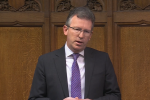The House of Commons was asked this week to support a number of further measures designed to limit the spread and impact off the Omicron variant of COVID-19. Let me take them in turn. The first measure was a reversal of a previous order which required contacts of suspected Omicron variant cases to self-isolate and its replacement with a daily testing requirement. I considered the self-isolation requirement to be excessive in these cases and voted against that order when it was presented to Parliament, so I welcome its reversal.
The second measure confirmed the requirement for those who look after others in the NHS or in social care to be vaccinated. I am not in favour of compulsory vaccination for the general population, but I do think exceptions should be made for those who are employed to look after those most likely to be vulnerable to the virus. The principle of compulsory vaccination for healthcare professionals is already established in relation to other health conditions and I voted in favour of the extension of it to the virus we are dealing with at the moment.
The third measure was to extend compulsory mask-wearing to a wider range of indoor venues. We have limited information about the harm that this new variant will cause but the evidence that it spreads particularly quickly seems clear. In those circumstances, I think it right to enact some precautionary measures until we know more. If this variant turns out to be more harmful, its virulence will cause the NHS a significant problem, threatening its capacity to treat other conditions, and by the time we know for sure it will be too late to slow its spread. However, new variants are inevitable in the progress of this pandemic and we cannot be certain that this variant will be any more damaging than those which we have already experienced, so the precautionary measures we take must not be so onerous that they become more damaging in themselves than the variant they protect against. For that reason I try to assess all these proposed restrictions against that test. In the case of this proposal for extended mask wearing, inconvenient as it is, I think it is a sensible measure to take. It is worth noting that mask wearing will not apply to hospitality venues, at a very important time of the year for them.
The final measure was the one that has had most media attention but which has perhaps also been most misrepresented, namely the requirement for entry to certain large events, where people are likely to be mingling with many others and therefore where the scope for widespread infection is great, to be conditional on vaccination or a negative test result. The fact that these are alternative requirements is important and often omitted form descriptions of this measure. It does not mean that entry to such events requires vaccination, as a negative test result, including from a Lateral Flow Test, will be sufficient. Again, balancing the risks this measure is seeking to limit against the burden it imposes, I conclude this is a proportionate measure. Most of us have become well-used to testing ourselves and doing so before mixing with a large number of strangers at a large event does not seem too much to ask. Importantly, both this measure and the extension of mask-wearing will expire on the 26th January.
Of course there is a context to these proposals, and frankly it would be better if recent events had not damaged the Government’s credibility in asking us to accept further restrictions, but as legislators we have a responsibility to look at the merits of the measures before us and decide whether each of them individually is worthy of our support, in an area of huge importance. It is not right either to reject a measure because of what we fear the next measure to be proposed might look like. I will consider subsequent proposals on their own merits too and, as I indicated earlier, I will vote against measures I do not believe to be sensible or proportionate. My assessment of the measures before us on this occasion was that, on balance, they were sensible and proportionate and should therefore be supported.

